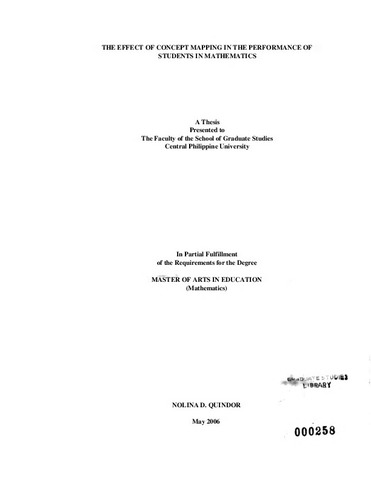The effect of concept mapping in the performance of students in mathematics
| dc.contributor.adviser | Canaman, Jessica B. | |
| dc.contributor.author | Quindor, Nolina D. | |
| dc.date.accessioned | 2021-06-17T08:21:38Z | |
| dc.date.available | 2021-06-17T08:21:38Z | |
| dc.date.issued | 2006 | |
| dc.identifier.citation | Quindor, N. D. (2006). The effect of concept mapping in the performance of students in mathematics (Unpublished Master's thesis). Central Philippine University, Jaro, Iloilo City. | en_US |
| dc.identifier.uri | https://hdl.handle.net/20.500.12852/1033 | |
| dc.description | Abstract only | en_US |
| dc.description.abstract | This experimental study investigated the effect of concept mapping in the performance of students in mathematics particularly in the topic rational expressions. This study tried to ascertain whether the use of concept mapping in teaching is better than the use of the traditional method in improving the performance of students in mathematics. Furthermore, the study also determined the perception of students on the use of concept mapping as a teaching strategy. The participants of the study were 80 purposively selected first year Bachelor of Science in Accountancy students of the Garcia College of Technology during the second semester school year 2005-2006. There are two sets of 40 students which are more or less similar in high school average in mathematics and score in college evaluation test in mathematics. The two sets were randomly assigned to the experimental group and the control group. Each group were assigned a number 1 and 2 written on two pieces of paper and placed in a container. The first piece of paper drawn was assigned as experimental group and the remaining sections as the control group. The experimental group was taught using concept mapping approach while the control was taught using the traditional method. Fifty items multiple choices teacher made, test was constructed and used before and after the introduction of the experimental treatment. A perception questionnaire was administered to determine the students’ perception on the use of concept mapping in teaching. Statistical tools used were the mean and standard deviation for descriptive statistics and the t-test and z-test both set at .05 level of significance, for the test of difference between means. The findings of the study revealed that the experimental group and the control group performed equally before the treatment, both had the same level of performance. Both the experimental and control groups significantly improved their performance after the treatment. Although both the experimental and the control groups significantly improved the performance after the treatment, comparison of the mean gains showed that the students in the experimental scored significantly higher than those in the control group. Thus, concept mapping is more effective than the traditional method in helping students understand mathematical concepts and their relationships. Students perceived concept mapping as a useful tool in teaching mathematics. | en_US |
| dc.format.extent | xi, 81 leaves | en_US |
| dc.language.iso | en | en_US |
| dc.subject.ddc | GSL Theses 610.73072 Q43 | en_US |
| dc.subject.lcsh | Mathematics--Study and teaching | en_US |
| dc.subject.lcsh | Mathematics--Study and teaching (Higher) | en_US |
| dc.subject.lcsh | Concept mapping | en_US |
| dc.subject.lcsh | Teaching--Methodology | en_US |
| dc.subject.lcsh | College students | en_US |
| dc.subject.lcsh | Academic achievement | en_US |
| dc.title | The effect of concept mapping in the performance of students in mathematics | en_US |
| dc.type | Thesis | en_US |
| dc.description.bibliographicalreferences | Includes bibliographical references | en_US |
| dc.contributor.chair | David, Fely P. | |
| dc.contributor.committeemember | Valdez, Luis | |
| dc.contributor.committeemember | Chin, Fely P. | |
| dc.contributor.committeemember | Millamena, Leopoldo A. | |
| dc.contributor.department | School of Graduate Studies | en_US |
| dc.description.degree | Master of Arts in Education major in Mathematics | en_US |
| local.subject | Garcia College of Technology (GCT) | en_US |


